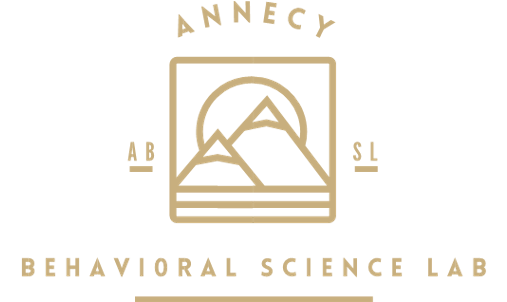
migs@absl.io
Annecy Behavioral Science Lab
74290 Menthon Saint Bernard
These workshops aim to help you navigate fundamental problems in behavioral science today and give you tools for more robust and efficient research. Add value to each of your research projects, prevent costly research errors and waste, and don’t get left behind by your peers!





Most behavioral science research today is strictly quantitative which often omit large amounts of information on context, meaning-making and processes leading to behavior. Further, many measures are constructed poorly, or in an ad-hoc manner, often developed in contexts other than the one in which the research is currently conducted in. This means for you as an organization, the data you are getting from quantitative scales alone may produce misleading insights. Qualitative and indigenous psychology approaches can help overcome such problems, providing a richer and deeper understanding of phenomena. This is done through the collection and analysis of non-numerical data such as interviews, open-ended data and naturalistic behavior. Qualitative and indigenous psychology approaches are a critical instrument for any applied behavioral scientist.
However, qualitative approaches are commonly haphazardly done, and applied practitioners often ask if “they’re doing it right”. This workshop provides a practical guide to qualitative and indigenous research with a focus on data analysis of interviews and open-ended survey data (and how to go beyond just counting themes). This workshop aims to give you a firm understanding of the principles, sampling, data analysis, data management, and theorizing about qualitative data. This workshop will feature applied exercises and will discuss common issues and practical tips in qualitative research.
Qualitative research, whether as a mixed-method or as stand-alone, provides insights difficult to acquire from quantitative approaches alone.
Qualitative research is a critical toolkit for any applied work, and this course will give you an firm understanding of the theory and practice of qualitative research. It will give you guidance on how to go beyond just counting themes, and give practical tips on various issues raised when conducting qualitative research
The workshop will also give you insights about better measurement, and how to contextualize (or develop) measures through the use of qualitative approaches
Introduction and Principles of Qualitative Research & Indigenous Psychology Approaches
Sampling Strategies – How Many and Who?
Interviewing
Creating the interview guide
Interviewing itself
Common issues and practical tips
Open-Ended Survey
Common issues and practical tips
Data Analysis
Coding and Thematic Analysis of Interview Transcripts
Coding and Thematic Analysis of Survey Responses
Advanced Coding
Creating and maintaining a codebook
Common issues and practical tips
Going beyond themes – analysis for deeper processes
Data management
Informed consent templates
Active tracking of qualitative evidence
Writing qualitative research
(Optional: using qualitative data to create measures)
3 days (4 hours per day)
With free 1 hour preworkshop and 1 hour postworkshop consultation
9000 euros

Famous effects in behavioral science do not replicate. What does that mean for you?
Behavioral science is confronted with waste and inefficient investment: by some counts, as much as 70% of prominent effects are shown to be poorly replicable. If you rely on the business-as-usual approach, chances are your company is confronted with similar inefficient use of resources.
Many behavioral science insights – at universities and companies alike – may not be true. Or worse, they may have unintended adverse effects. Also worrisome is that the general public is becoming increasingly aware of the issue. How can you ensure your evidence-based behavioral science is up-to-date and as efficient as possible?
In this workshop, the “replication crisis” and its different causes will be tackled by some of the leading experts in psychology. Clarity will be given to current, contentious debates. Participants will be equipped with tools to run their own research more robustly and more efficiently and to better understand how to make their own work more robust and less wasteful. The workshop will benefit client outcomes and increase the value-added of the research services you provide.
Learn from the costly errors of others so we do not reproduce them.
Don’t get left behind! Even the public now know about the field’s problems (see for example the popular articles in The Atlantic, The New York Times ) creating a reputational hurdle for organizations.
Be provided with the tools for designing robust research and for better evaluation of evidence.
The Replication Crisis
•The Logic and Illogic of p-values
•When p-Values Break: Questionable Research Practices
•Philosophy of Science & Philosophy of Statistics
•Tools: Effect Size, Sensitivity Analyses, and Open Science Templates
•Tools: Building research projects robustly and efficiently
•Your company baseline: how to incorporate these tools to add value
4 hours (morning/ afternoon session)
With free 1 hour pre-workshop and 1 hour post-workshop consultation
3000 euros

High impact behavioral science often entail research that needs coordination across multiple countries and continents. These skills are easily transferable to complex studies in the business world.
This workshop aims to equip you with principles and concrete tools in starting and managing complex multi-site research projects. It will feature case studies of the unique issues faced in multi-partner collaborations and ways to tackle these.
Bigger questions need bigger collaborations, however multi-site projects bring with it unique challenges. This course equips you with tools to navigate these issues.
Large-scale collaborations will be the future of behavioral sciences. By attending this workshop, you will be in a better position to innovate in your industry and create high-value research
Initiating collaborations
Project management :
Managing collaborations & conflict management
Communication tools
Standardization across sites
Data management
Project tracking, risk management, & timelines
How to credit, collaborate, and write reports with more than 200 collaborators
Common issues in multi-site project management
Leadership and other principles
4 hours (morning/ afternoon session)
3500 euros

Machine learning is one of the fastest growing areas in data science and statistics. It is growing in popularity in the behavioral, health, and social sciences. By “learning” from the data, machine learning models aim to make robust predictions for either continuous outcomes (regression models) or categorical outcomes (classification models).
By the end of the workshop, participants should be able to apply machine learning algorithms and understand the theory behind these techniques.
Bundle 1 : BEGINNERS GUIDE TO ML (INCLUDES BASICS OF R)
Bundle 2 : STANDARD GUIDE TO ML
Bundle 3 : ADVANCED GUIDE TO ML
Machine learning is an exciting new technique. Without learning these newer tools, companies are at risk of being left behind by their competitors.
Machine learning is a powerful tool, especially for big data sets. Learning the machine learning algorithms taught in this workshop will give one a versatile tool that one can use for different research questions.
It becomes easier and cheaper to rely on existing (secondary) datasets to ask your research questions.
Machine learning using R is free.
Bundle 1 is best for beginners with no or little knowledge of the programming language, R.
Bundle 2 is the standard program that takes you through how to build and apply machine learning models that can be used for behavioral science data.
Bundle 3 is an advanced workshop that adds in a module on making inferences from the model rather than just prediction.
Bundle 1 :
Beginners Guide To
Machine Learning
Time: 5 days (3 hours per day)
Modules
Learning R
Introduction to R
Data Cleaning and Preparation
Regression Models
Linear Regression
Decision Trees
Random Forests
Classification Models
k-Nearest Neighbors
Decision Trees
Random Forests
Building Models
Building many different models
Learning how to pick the best one
Tuning hyperparameters of the chosen model
Conclusions and actionable insights
Price : 10,000 euros
Bundle 2 :
Standard Guide to
Machine Learning
Time: 3 days (3 hours per day)
Modules
Regression Models
Linear Regression
Decision Trees
Random Forests
Classification Models
k-Nearest Neighbors
Decision Trees
Random Forests
Building Models
Building many different models
Learning how to pick the best one
Tuning hyperparameters of the chosen model
Conclusions and actionable insights
Price : 7,500 euros
Bundle 3 :
Advanced Guide to
Machine Learning
Time: 5 days (3 hours per day)
Modules
Regression Models
Linear Regression
Decision Trees
Random Forests
Classification Models
k-Nearest Neighbors
Decision Trees
Random Forests
Building Models
Building many different models
Learning how to pick the best one
Tuning hyperparameters of the chosen model
Inferences
What do we learn from the models?
How to transform conclusions and results into actionable insights
Price : 12,500 euros

| Cookie | Duration | Description |
|---|---|---|
| cookielawinfo-checkbox-analytics | 11 months | This cookie is set by GDPR Cookie Consent plugin. The cookie is used to store the user consent for the cookies in the category "Analytics". |
| cookielawinfo-checkbox-functional | 11 months | The cookie is set by GDPR cookie consent to record the user consent for the cookies in the category "Functional". |
| cookielawinfo-checkbox-necessary | 11 months | This cookie is set by GDPR Cookie Consent plugin. The cookies is used to store the user consent for the cookies in the category "Necessary". |
| cookielawinfo-checkbox-others | 11 months | This cookie is set by GDPR Cookie Consent plugin. The cookie is used to store the user consent for the cookies in the category "Other. |
| cookielawinfo-checkbox-performance | 11 months | This cookie is set by GDPR Cookie Consent plugin. The cookie is used to store the user consent for the cookies in the category "Performance". |
| viewed_cookie_policy | 11 months | The cookie is set by the GDPR Cookie Consent plugin and is used to store whether or not user has consented to the use of cookies. It does not store any personal data. |
